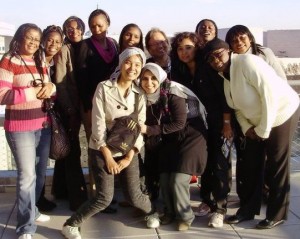The Mirror, Vol. 15, No. 698
My time in the United States for one month, after participating in an international seminar for journalists at the Population Reference Bureau, longer than previously intended, gives me some insights into the life of women in Cambodia and around the world. My intensive contacts with different women from Africa, Asia, Europe, and America also do not only tell me how they live their lives back in their countries, but also how they are struggling against all prejudices as women, and how they are juggling between their families and careers.
The years of 2009, 2010, and hopefully 2011, have brought me closer to mostly female journalists from different countries. In 2009, I spent almost one month living in contact with Asian women from China, Indonesia, Germany, Nepal, and Pakistan. Thanks to the invention of planes and buses which took me to Malaysia (Kuala Lumpur and Penang) and Vietnam (Ho Chi Minh City) to join the teach Blog Festival and the Free Open Source Software (FOSS) meetings, I met with women about my age. And, from my first trip to the United States in late 2010, I met female journalists from almost 10 African countries. Those women really changed my perception about women in Africa.
These contacts let me know that I am not alone in trying to grow out of this ‘traditional’ box or what previously was expected of women. The last encounter with other women brought me even better insights into the lives of African women whom Asian women viewed as tough and poor.
Tradition varies from country to country, and what you value may not be valued by others. While Cambodia values family spirit, the West places more importance on the individual. Meeting other female journalists has been special for me because I have learnt a lot from their experiences and struggles. In Cambodia, journalism is not a favorite choice of career since it comes with a sense of insecurity and risk. Cambodian women rather go for finance and accounting, management or, if it is not intellectual work, careers in cosmetics can be very popular too.
From my trip, I realized that Cambodia is running behind of all these countries, even African countries, where more women are into journalism and other development areas. We have very few women working in newsrooms here, but this cannot be the fault of the women. Instead, we should question the institutional encouragement and responsibility of relevant organizations.
As a matter of fact, from my three-year experience working as a journalist, I have never really encountered Cambodian female editors working in the newsroom at all. Of course, there are female editors, but they are mostly foreigners or Cambodians from the diaspora from the West. But that is different from having Cambodian women themselves working as editors. What opened my eyes wider was when I heard that all of the African women I met in the US are senior reporters and editors, with years and years of experience. And I asked the question to myself: What about Cambodia?
Some could blame the Khmer Rouge regime for slaughtering the intellectuals and professionals, and during the last 30 years, Cambodia had been trying to stand up with growing pains. However, Africa is not any better, with years of civil war, poverty, violence, and more human issues that need to be dealt with right away. Even though this small group of African women cannot represent the whole population in their countries, I believe at least it is important to note that Cambodia has a lot to catch up with African women who to me looked strong and adamant.
With all this said, women from Malaysia, Singapore, and Vietnam also inspire me to overcome barriers I find in Cambodia since we are closer and have similar mindsets. Generally, many Cambodian women know their place is the home, but the world is changing. Women, like men, have economic wants and needs to be addressed. And when it comes to the question about family and career, women tend to face more challenges in that they have double responsibilities and work that not all men can comprehend. I dare say that women, at the workplace, face difficulties in balancing between family and career, and as for those who do really well, they have to make a lot of sacrifices such as staying single, earning more to support the whole family, or finding a supportive man to stay with. But many decide to go for family no matter what, wasting their talent only to regret it years later.
I think that this will be a question for women in this century to ponder, because there is no easy answer to that. However, it is believed that both men and women play an equal role in changing this situation. Institutes cannot focus on women or men alone but have to engage both of them in gender work. And that is when we have real equity and equality between women and men, but for now, my African friends can joke about finding supportive husbands in order to work as journalists. Yet, of course, not many men understand the value of being a woman, and education about gender is indispensable for the betterment of the future of each country and the world.
KEO Kounila
Have a look at the last editorial – you can access it directly from the main page of the Mirror.
And please recommend The Mirror also to your colleagues and friends.


Recent Comments